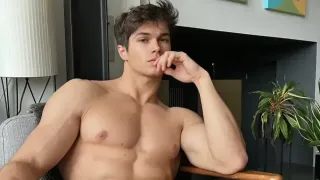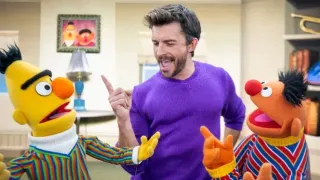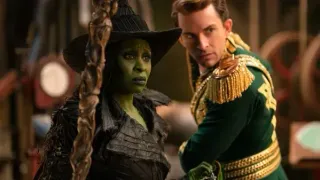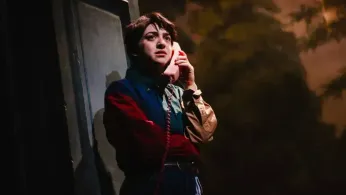
4 hours ago
EDGE Interview: A Perfect Piece of Art: Maya Jacobson on the Craft and Courage of ‘Fun Home’
Steve Duffy READ TIME: 3 MIN.
Winner of five Tony Awards including Best Musical, Fun Home is a beloved, groundbreaking, and emotionally rich story of seeing your parents through grown-up eyes. Based on Alison Bechdel’s best-selling graphic memoir, the musical traces Alison through childhood, college, and adulthood as she unravels her coming-out story, and her complex relationship with a brilliant, volatile, and closeted father. How have the mysteries of her father’s life shaped her own understanding of love and acceptance of her lesbian identity? With a soaring score by Jeanine Tesori and a sharp, heartfelt book by Lisa Kron, Fun Home is a beautiful, can’t-miss theatrical experience, directed by Logan Ellis.
To dig deeper into the artistry and emotional truth behind this production, we sat down with Maya Jacobson to talk about embodying Medium Alison.
EDGE: For those unfamiliar, how would you describe Fun Home in your own words?
MJ: I would describe Fun Home as Alison Bechdel’s autobiographical memoir that explores her childhood, her coming out, and her father’s suicide. The book unpacks how these events intersect, highlighting the similarities and differences between Alison and her father, Bruce Bechdel, as well as her complex relationship with her mother, Helen. At its core, it’s a reflection on family, identity, and queerness.
EDGE: Fun Home is based on Alison Bechdel’s graphic memoir. How does the stage adaptation capture the spirit of the book?
MJ: The stage adaptation of Fun Home is remarkable, but honestly, the book itself is extraordinary. I can’t recommend it enough—it’s an unbelievable graphic novel. Alison Bechdel’s ability to combine stunning illustrations with sharp, witty writing is astonishing. As a copywriter, when I’m not acting, I deeply appreciate writing that uses the perfect word to capture a feeling or idea, and Bechdel excels at that—especially when dealing with material that’s so raw and personal. Writing about difficult things is the hardest task, and this book does exactly that. The musical, in turn, focuses on that very process: Bechdel writing through trauma. It distills the emotional core of the graphic novel and brings it to life on stage. In an interview, Bechdel mentioned how the musical expands certain elements of the book through human bodies on stage—something theater does best. It’s a perfect adaptation because it offers a new way to tell a story that was already perfect in its original form.
EDGE: What aspects of Medium Alison’s personality did you most connect with when preparing for the role?
MJ: There are so many things that resonate with me. One of the biggest is her anxiety. I remember being in ninth grade and realizing, “I am queer. I know that I am.” The anxiety that came with that was overwhelming. In the show, one of the first things I sing on stage is about drawing: “Not too bad if I say so myself. This outshines the first one I drew.” Then I sing, “I don’t know which way up. I don’t know what I’m supposed to do.” That feeling—of uncertainty and self-doubt—is something I deeply connect with. It takes me right back to how I felt about my own queerness. That’s why I feel such a strong tie to Medium Alison. Another thing is embarrassment. The character constantly thinks she’s embarrassing, and honestly, I relate. I am embarrassing—especially when I was 19 and around people I thought were attractive. So those two things—anxiety and embarrassment—are core connections between me and Medium Alison.
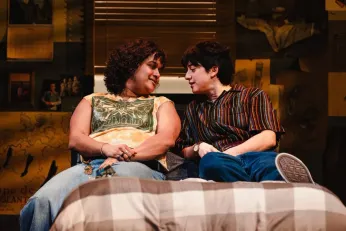
Source: Marc J. Franklin
EDGE: The show is unique in its structure, with three versions of Alison at different ages. How did you collaborate with the actors playing Small Alison and Adult Alison to create a cohesive portrayal?
MJ: I truly believe Logan Ellis is exceptional—remember that name. He’s a director who is going to change the world. He’s already changed my life through the way he approached having three actors play one character and created a cohesive physical language for us. He found natural elements in our individual scenes and wove them together, sometimes incorporating one of us into another’s performance to enhance it. One of my favorite examples is this: when Small Alison sings Ring of Keys and the music builds, she starts nodding in recognition of the butch delivery woman. Later, in my scene, when Joan asks if I want to be kissed, I do the same nod. Those kinds of connections—subtle, powerful—only happen because of Logan’s outside eye and his deep understanding of the story and his three actors. And then there’s Sarah Bockel and Lyla Randall—they’re incredible. I learned so much just by watching them every day. Especially with Sarah, who is in all my scenes—feeling her reactions to what I do ignites everything. That’s what this story is about: an artist watching, witnessing, revisiting, and diving deep into the moments that shaped her life.
EDGE: The score by Jeanine Tesori and Lisa Kron is both intimate and powerful. How do the songs drive the narrative differently from dialogue alone?
MJ: They’re perfect. Honestly, to me, the best musicals follow this principle: we sing when speaking isn’t enough—when we need something more to propel the story forward. Fun Home does that flawlessly. Every song feels essential in real time. The music doesn’t just underscore the story; it sets up moments, draws the audience in, lightens heavy scenes, or deepens ambiguity when needed. It never feels like “I’m singing” in the traditional sense—it feels like a natural continuation of thought and emotion. There are musicals where someone stands center stage and belts out a song, and that can be thrilling. But sometimes, in those shows, I find myself wanting more story. Fun Home never leaves me wanting. The songs move the narrative beautifully. For example, singing “Changing My Major” after the intimacy with Joan—it’s everything my 19-year-old self would have wanted to express. It feels like a soul-level connection, a full release of emotion. That’s the magic of this piece. Lisa Kron and Jeanine Tesori are simply the best. They’ve created something extraordinary.
EDGE: Fun Home is groundbreaking as one of the first Broadway musicals with a lesbian protagonist. What does it mean to you to embody that representation on stage?
MJ: Everything about this show matters to me. I feel incredibly fortunate in my career to have played Medium Alison twice, as well as other Jewish characters in productions like Fiddler on the Roof and A Walk on the Moon. Being Jewish and queer are two huge parts of who I am, and getting to represent those identities onstage as someone who shares them is a privilege I never take for granted. It feels especially meaningful in the current political climate, knowing there are queer kids in the audience who come to see this show. I get to stand onstage—alive, full—and share moments that are joyful and beautiful, moments that show what it means to be queer, to love someone, and to own yourself. That is a privilege, and I hold it close every single time I perform.
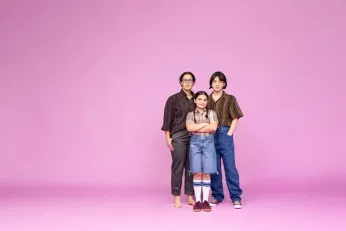
Source: Nile Hawver
EDGE: What lessons from Alison’s journey have stayed with you beyond the stage?
MJ: I think Alison is incredibly brave—especially 19-year-old Alison. Coming out is hard for many people, and in the 1980s, it was objectively even harder. What inspires me most is how Alison Bechdel has owned every part of herself and her artistry. Even at 19, she knew, “This is something I’m good at, and I can trust myself.” That trust in self is something I often struggle with, so getting to embody that on stage feels transformative. Singing to an audience, declaring, “I’m changing my major to Joan,” is like saying, “I believe in myself, in what I feel, and in what I know to be true.” Doing that every night, I hope, will shift something in me—help me trust my own intuition and self-belief.
I’m also struck by the grace Alison gives her family in the way she tells this story—how she observes them without judgment. Watching Sarah Bockel take in moments with Helen and Bruce and process them reminds me that we can all lead with grace toward the people in our lives. There’s that quote—‘Holding on to resentment is like drinking poison and expecting someone else to die.’ Forgiveness matters—for others and for ourselves. Love is complicated, especially when it comes to family. How do we love people for who they are and where they’re at, while also caring for ourselves, setting boundaries, and standing up for what we need? That’s the heart of this story for me.
EDGE: Why do you think Fun Home continues to be celebrated years after its Broadway run?
MJ: There are so many reasons why Fun Home matters. First, having a lesbian protagonist in a musical was a groundbreaking move. We’ve seen variations since, and exciting new works are emerging, but Fun Home was the first to do it in this way. The original graphic novel is, in itself, a perfect piece of art—so adapting it for the stage with such care and precision is extraordinary. The music is stunning, and the book is so strong that the show often feels like a play with music—except the songs are so good that it’s undeniably a musical. It sets the bar for what a musical can be: funny, devastating, and deeply human. It’s a show for everyone—parents, children, queer people, straight people. Different audiences connect with different parts, but the show invites all of us to feel and to grieve. If you’ve lost someone, this musical gives you space to sit in a theater and watch someone process loss in real time—what it means to love through that loss. At its core, every play and musical is about love, even if it’s framed by war or death. Theater is about relationships, and Fun Home captures that perfectly. There isn’t a word I would change. It’s a perfect piece of art. And it’s still relevant—especially in the political climate we’re in now. It’s bold, it’s defiant, and it’s beautifully human. Our production, under the direction of Logan Ellis and music direction by Jesse Rosso, has taken such care with this piece. The entire creative team and designers have approached it with artistry and respect. It’s a truly special production, and I feel so lucky to be part of it.
For show and ticket information, visit https://www.huntingtontheatre.org

